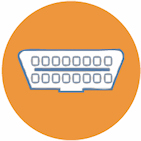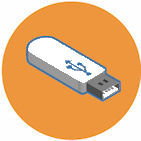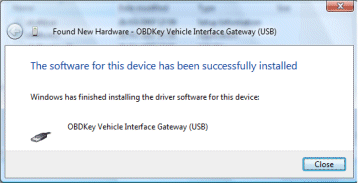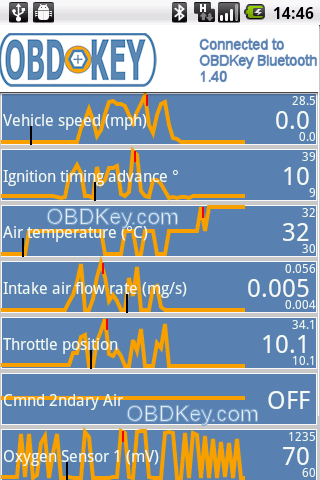|
OBDKey
Support
 How do you install OBDKey?
How do you install OBDKey?
 How does OBDKey work?
How does OBDKey work?
 Will OBDKey work with all OBD-II
compliant vehicles?
Will OBDKey work with all OBD-II
compliant vehicles?
 Does OBDKey support vehicles with
ISO 9141, KWP2000?
Does OBDKey support vehicles with
ISO 9141, KWP2000?
 Does OBDKey support vehicles with SAE
J1850?
Does OBDKey support vehicles with SAE
J1850?
 Does OBDKey support
vehicles with latest CAN bus?
Does OBDKey support
vehicles with latest CAN bus?
 Available with Wired (USB)
communications
Available with Wired (USB)
communications
 Available with Wireless
(Bluetooth) communications
Available with Wireless
(Bluetooth) communications
 Available with High Speed Wireless
(WiFi) communications
Available with High Speed Wireless
(WiFi) communications
 Software
included for Windows PC (.NET application)
Software
included for Windows PC (.NET application)
 Software
included for Windows Mobile and Windows Pocket PC (PDA, Mobile)
Software
included for Windows Mobile and Windows Pocket PC (PDA, Mobile)
 Software included for
Windows Smartphones
Software included for
Windows Smartphones
 Software
available (3rd party) for Java based mobile phones
Software
available (3rd party) for Java based mobile phones
 Software included for Palm
devices
Software included for Palm
devices
 Software included for Android phones
Software included for Android phones
 Software available
(3rd party) for Apple Computers
Software available
(3rd party) for Apple Computers
 Software available (3rd party) for Apple iPhone
and iPod Touch
Software available (3rd party) for Apple iPhone
and iPod Touch
 Works with many other third party car diagnostic software applications
Works with many other third party car diagnostic software applications
 Support for iPhone
Support for iPhone
 Support for
Android
Support for
Android
 OBDKey Software supports standard OBD Modes 1 to 9. The OBDKey unit can
also access many protocol modes beyond OBDII.
OBDKey Software supports standard OBD Modes 1 to 9. The OBDKey unit can
also access many protocol modes beyond OBDII.
 Supports ISO 14229 (extended
OBD) Supports ISO 14229 (extended
OBD)
 OBDKey can be configured to transmit to any 11bit or 29 bit CAN addresses (id's),
at many CAN bit rates, allowing access to data beyond standard OBD-II information.
OBDKey can be configured to transmit to any 11bit or 29 bit CAN addresses (id's),
at many CAN bit rates, allowing access to data beyond standard OBD-II information.
 OBDKey can be
configured to receive from any 11bit or 29 bit CAN addresses (id's) and
CAN speeds up to 1,000 kilobits per second.
OBDKey can be
configured to receive from any 11bit or 29 bit CAN addresses (id's) and
CAN speeds up to 1,000 kilobits per second.
 Software development support (SDK) available with sample code (C# and C++).
Software development support (SDK) available with sample code (C# and C++).
 Firmware version 1.40 now in
production. Firmware version 1.40 now in
production.
 Firmware 1.40 is upgradeable
using a Windows application supplied only to OBDKey customers. Firmware 1.40 is upgradeable
using a Windows application supplied only to OBDKey customers.
Other Advanced Features
 VW protocol KW1281 (like VAG
COM) fully supported VW protocol KW1281 (like VAG
COM) fully supported
 Subaru SSM protocol (like
ECUExplorer / JDash ) fully supported.
Subaru Support with OBDKey. Subaru SSM protocol (like
ECUExplorer / JDash ) fully supported.
Subaru Support with OBDKey.
 User may set the ISO baud
rate to 10400, 9600, 4800, 15625, 62500, 57600, 8192 User may set the ISO baud
rate to 10400, 9600, 4800, 15625, 62500, 57600, 8192
 User may programmatically
set the KLINE and LLINE directly User may programmatically
set the KLINE and LLINE directly
 User may programmatically
write data to FLASH memory directly. User may programmatically
write data to FLASH memory directly.
 User may programmatically
read the OBDKey interface type: Bluetooth, USB or WiFi/WLAN User may programmatically
read the OBDKey interface type: Bluetooth, USB or WiFi/WLAN
 User may programmatically
send frames (K Line and J1850) transparently (for non OBD-II applications) User may programmatically
send frames (K Line and J1850) transparently (for non OBD-II applications)
 Maximum send and receive
frame sizes increased beyond OBD-II requirements. Maximum send and receive
frame sizes increased beyond OBD-II requirements.
ELM327 Compatibility
 OBDKey supports the useful
ELM327 AT commands set. OBDKey supports the useful
ELM327 AT commands set.
 OBDKey USB only :User may
programmatically set the PC to device baud rate to 38400, 57600, 250000,
500000 bits / second. OBDKey USB only :User may
programmatically set the PC to device baud rate to 38400, 57600, 250000,
500000 bits / second.
 Configure keep alive frame
up to 6 bytes Configure keep alive frame
up to 6 bytes
 Independently set
timer_iso_P2, and timer_iso_P3Min Independently set
timer_iso_P2, and timer_iso_P3Min
 CAN variable frame size
(variable DLC) CAN variable frame size
(variable DLC)
 How do you install OBDKey?
How do you install OBDKey?
 |
Step 1: Locate the
diagnostic port in your vehicle. |
 |
Step 2: Connect your
OBDKey unit to the diagnostic port.
|
 |
Step 3: Install the
software supplied on the 2.0 GB USB flash drive (memory stick) to your PC, Pocket PC, PDA, Palm or Smartphone. |
 How does it work?
How does it work?
First plug your OBDKey
into your vehicle's OBD-II data link connector. This is
usually under the steering wheel, in the centre console, under the handbrake
or in the passenger side footwell. OBDKey will automatically detect
the type of vehicle communications that are required.
Install and run the supplied software on your PC,
Pocket PC, Palm or mobile phone. The software will detect the OBDKey unit
via Bluetooth or via USB automatically.
The OBDKey software will
then will access the vehicle’s on-board computers and will inform what
problems may exist and will provide live readings from each of the vehicle
sensors.
 Will
work with all OBD-II compliant vehicles Will
work with all OBD-II compliant vehicles
OBD stands for on-board
diagnostics and defines the modern fuel managed vehicle's electronic
interface system.
The OBD interface is available on all OBD-II / EOBD compliant vehicles. 2001 and
newer petrol cars sold in Europe are EOBD compliant. Diesel (compression
ignition) vehicles were not required to support OBD until 2004. Some
pre-2001 petrol vehicles and pre-2004 diesel vehicles have a 16-pin connectors
but they may not be OBD-II or EOBD compliant. OBDKey also features full CAN bus
compatibility with the latest vehicles from 2008 onwards.

16 Pin OBD
Connector
Locating your OBD
connector can be a difficult task as vehicle manufacturers tend to hide away the
socket. But it is worth knowing that the OBD connector will always be
found inside the vehicle and within easy reach from the driver's set position.
Check in the driver's foot well, under the steering wheel, behind panels in the
dashboard fascia and the central area between the driver's seat and the
passenger seat. Some connectors have been located behind ashtrays, under
the passenger seat and even over by the passengers door.
Once you find the
OBD connector, check which pins which are present. The view above is shown
looking into the connector, with the locating "bump" at the bottom.
The connector must
have pins 4, 5 for ground connections and pin 16 for 12 volt power supply from
the vehicle battery.
The following
connections are dependent on the protocol in use by the vehicle:
-
Pin 2 and pin 10
for SAE J1850 (PWM or VPWM) protocols.
-
Pin 7 for ISO
9141-2 and ISO 14230 (KWP2000) communications. Pin 7 is also known as the
K-Line.
-
Pin 15 is also
known as the L-Line. may or may not be present for these protocols.
-
Pin 6 and pin 14
are present for CAN bus (ISO 15765-4) protocols.
Generally speaking
the following vehicles have these protocols:
-
VPWM:
General Motors, Chrysler
-
PWM: Ford
models to 2003 with EEC-V engine management system. Including Ford Cougar (all
UK models), Ford Puma (1.6 and 1.7), Ford Fiesta Zetec models to 2003, Ford
Mondeo Zetec models to 2003, Ford Focus to 2003. Newer Jaguar S-Type and Jaguar
X-Type. Pre 2004 Mazdas
-
ISO / KWP2000:
Most European and Asian manufacturers. Alfa Romeo, Audi, BMW, Citroen, Fiat,
Honda, Hyundai, Jaguar (X300, XK), Jeep since 2004, Kia, Land Rover, Mazda,
Mercedes, Mitsubishi, Nissan, Peugeot, Renault, Saab, Skoda, Subaru, Toyota,
Vauxhall, Volkswagen (VW) since 2001, Volvo to 2004
-
CAN: Ford,
Mazda, Volvo since 2004. Some vehicles have a CAN bus system along side
the ISO/KWP2000 system for diagnostics as well as inter-module communications.
-
Full CAN bus
compatibility with the latest vehicles from 2008 onwards.
 OBDKey supports OBD-II Compliant Vehicles
OBDKey supports OBD-II Compliant Vehicles
 Does OBDKey Support Windows 7, Windows 8 and Windows 10? Does OBDKey Support Windows 7, Windows 8 and Windows 10?
Yes. We have written a
user guide on how to configure the OBDKey Bluetooth and OBDKey USB devices
under Windows 7, Windows 8 and Windows 10. Download
here
(PDF).
 Do you provide OBDKey (OBD to USB) USB Drivers for Windows Vista, Windows 7, Windows 8 and Windows
10?
Do you provide OBDKey (OBD to USB) USB Drivers for Windows Vista, Windows 7, Windows 8 and Windows
10?
Yes. The drivers are
supplied on the 2.0 GB USB flash drive (memory stick) in the "USB Drivers" Folder (and "USB
Drivers\Windows x" respectively). Once installed you will see
the successful installation dialog box.

Windows Vista - Successful
USB Driver Installation Dialog
 Supports
vehicles with ISO 9141, KWP2000 Supports
vehicles with ISO 9141, KWP2000
Acura, Alfa
Romeo, Astra Brasil, Audi, BMW, Chevrolet, Chrysler, Citroen, Daewoo,
Daimler (UK), Dodge, Ferrari, Fiat, Geo, Honda, Hyundai, Infiniti, Jaguar,
Jeep, Kia, Lancia, Land Rover, Range Rover, Lamborghini, Lexus, Lotus,
Mazda, Mercedes, Mercury, Mini, Mitsubishi, Nissan, Opel, Peugeot, Plymouth,
Porsche, Renault, Saab, Saturn, Seat, Skoda, Smart, Subaru, Suzuki, Toyota,
Triumph, Volkswagen, Volvo, Zastava-Yugo
 OBDKey supports ISO 9141 and KWP2000
OBDKey supports ISO 9141 and KWP2000
 Supports vehicles with SAE J1850
Supports vehicles with SAE J1850
J1850 comes in
two variants, PWM and VPWM. OBDKey supports BOTH variants.
J1850 PWM
support: Ford (1995 to 2004), Mazda (pre 2004), Mercury (pre 2004)
J1850 VPWM
support: Buick, Cadillac, Chevrolet, Chrysler, Dodge, GMC, Isuzu, Jeep,
Nissan (USA, 1996-1998), Oldsmobile, Pontiac, Regal, Saturn, Toyota (USA)
4Runner, Corola, Tacoma ( 1995 to 1997), Winnabego
 OBDKey supports SAE J1850
OBDKey supports SAE J1850
 Supports vehicles with
latest CAN bus
Supports vehicles with
latest CAN bus
Since 2003,
some vehicle makes and models started using a new diagnostic communication
protocol called CANbus. By 2008 all vehicles sold for the United States
market must use the CANbus protocol.

Since 2005
Aston Martin, since 2005 Audi, since 2007 BMW, since 2007 BMW Mini, since
2004 Chrysler, since 2003 Ford, since 2003 General Motors, since 2006 Saab,
since 2006 Honda, since 2006 Jaguar, since 2005 Land Rover, since 2003
Mazda, since 2005 Mercedes, since 2006 Mitsubishi, since 2007 Porsche, since
2007 Subaru, since 2004 Lexus, since 2004 Toyota, since 2004 Volvo, since
2006 Volkswagen.
OBDKey also
features full CAN bus compatibility with the latest vehicles from 2008
onwards.
 OBDKey supports CanBus
OBDKey supports CanBus
 Wired (USB) communications
Wired (USB) communications
OBDKey is
available with a wired communication link to a standard USB (2.0)
connection. Full software drivers are supplied for the PC to which the
OBDKey will be connected.
 OBDKey available with a USB interface
OBDKey available with a USB interface
 Wireless (Bluetooth)
communications
Wireless (Bluetooth)
communications
OBDKey is
available with a wireless, Bluetooth, link to any device equipped with a
built-in or add-on Bluetooth radio device. Software may be sold
separately, depending on the device. See software
section.
 OBDKey available with a Bluetooth interface
OBDKey available with a Bluetooth interface
 High Speed Wireless (WiFi)
communications
High Speed Wireless (WiFi)
communications
OBDKey is
available with a wireless, WiFi, link to devices equipped with a
built-in or add-on WiFi / WLAN / 802.11 radio device. Application software may be
sold separately, depending on the device. See
software section.
 OBDKey available with a WiFi /WLAN interface
OBDKey available with a WiFi /WLAN interface
 Software
included for Windows PC (.NET application)
Software
included for Windows PC (.NET application)
OBDKey is
supplied with our own software application for Windows (Windows 7, Windows
Vista, Windows XP, Windows 2000, Windows 98SE) PCs. This program
will be able to
-
Read sensor
'live' data
-
Read engine
management diagnostic fault codes
-
Display engine
management diagnostic fault codes in plain text by decoding the standard "P"
codes.
-
Clear engine
management diagnostic fault codes
-
Read vehicle
information data (e.g. VIN)
-
Read vehicle
freeze frame data
-
Clear vehicle
freeze frame data
-
Read vehicle
oxygen sensor parameters
-
Clears the
"check engine" light
See the
software section for more information.
 OBDKey is supplied with software for the Windows PC
OBDKey is supplied with software for the Windows PC
 Software
included for Windows Mobile (Professional, PDA, Touchscreen)
Software
included for Windows Mobile (Professional, PDA, Touchscreen)
OBDKey is
supplied with a powerful software application for Windows Pocket PC /
Windows Mobile. This program will be able to
-
Read sensor
'live' data
-
Read engine
management diagnostic fault codes
-
Display engine
management diagnostic fault codes in plain text by decoding the standard "P"
codes.
-
Clear engine
management diagnostic fault codes
-
Clears the
"check engine" light
See the
software section for more information.
 OBDKey is supplied with software for Windows Mobile Professional
OBDKey is supplied with software for Windows Mobile Professional
 Software included for
Windows Mobile Smartphones (Standard, Non Touchscreen)
Software included for
Windows Mobile Smartphones (Standard, Non Touchscreen)
OBDKey is
supplied with a powerful software application for Windows Smartphone /
Mobile Phones. This program will be able to
-
Read sensor
'live' data
-
Read engine
management diagnostic fault codes
-
Display engine
management diagnostic fault codes in plain text by decoding the standard "P"
codes.
-
Clear engine
management diagnostic fault codes
-
Clears the
"check engine" light
See the
software section for more information.
 OBDKey is supplied with software for the Windows Smartphones
OBDKey is supplied with software for the Windows Smartphones
 Software for Java based mobile phones
Software for Java based mobile phones
OBDKey is compatible with some
third party Java based applications.
 OBDKey will have software for Java capable Mobile Phones
OBDKey will have software for Java capable Mobile Phones
 Software included for Palm
devices
Software included for Palm
devices
OBDKey is
supplied with a powerful software application for Palm handheld computer
devices. This program will be able to
-
Read sensor
'live' data
-
Read engine
management diagnostic fault codes
-
Display engine
management diagnostic fault codes in plain text by decoding the standard "P"
codes.
-
Clear engine
management diagnostic fault codes
-
Clears the
"check engine" light
See the
software section for more information.
 OBDKey is supplied with software for the Palm
OBDKey is supplied with software for the Palm
 Software for Apple Computers
Software for Apple Computers
Not at first
release. See the software section for more
information.
 OBDKey is accessible from Apple Computers using 3rd party software
OBDKey is accessible from Apple Computers using 3rd party software
 Support for iPhone
Support for iPhone
See the
OBDKey WiFi for more
information.
 OBDKey is accessible from Apple iPhones Using 3rd Party Applications (OBDKey
WLAN only)
OBDKey is accessible from Apple iPhones Using 3rd Party Applications (OBDKey
WLAN only)
 Support for Android
Support for Android
 OBDKey is accessible from Google Android devices
OBDKey is accessible from Google Android devices

 OBDKey Android App "OBDKey
Mobile" available via the
Google Android Market
OBDKey Android App "OBDKey
Mobile" available via the
Google Android Market
(OBDKey
Bluetooth only)
 Works with many other third party car diagnostic software applications
Works with many other third party car diagnostic software applications
See the
software section for more information.
 Works with ISO 14229 Commands
Works with ISO 14229 Commands
Supports the
following ISO 14229 commands (i.e. all of them):
DiagnosticSessionControl
EcuReset
SecurityAccess
CommunicationControl
TesterPresent
AccessTimingParameter
SecuredDataTransmission
ControlDTCSetting
ResponseOnEvent
LinkControl
ReadDataByIdentifier
ReadMemoryByAddress
ReadScalingDataByIdentifier
ReadDataByPeriodicIdentifier
DynamicallyDefineDataIdentifier
WriteDataByIdentifier
WriteMemoryByAddress
ClearDiagnosticInformation
ReadDTCInformation
InputOutputControlByIdentifier
RoutineControl
RequestDownload
RequestUpload
TransferData
RequestTransferExit
 OBDKey supports ISO 14229 Commands
OBDKey supports ISO 14229 Commands
 Works with ISO 14230 /
KWP2000 Commands
Works with ISO 14230 /
KWP2000 Commands
OBDKey supports
the following ISO 14230 commands (i.e. all of them):
StartDiagnosticSession service
StopDiagnosticSession service
SecurityAccess service
TesterPresent service
EcuReset service
ReadEcuIdentification service
ReadDataByLocalIdentifier service
ReadDataByCommonIdentifier service
ReadMemoryByAddress service
DynamicallyDefineLocalIdentifier service
WriteDataByLocalIdentifier service
WriteDataByCommonIdentifier service
WriteMemoryByAddress service
SetDataRates service
StopRepeatedDataTransmission service
ReadDiagnosticTroubleCodes service
ReadDiagnosticTroubleCodesByStatus service
ReadStatusOfDiagnosticTroubleCodes service
ReadFreezeFrameData service
ClearDiagnosticInformation service
InputOutputControlByLocalIdentifier service
InputOutputControlByCommonIdentifier service
StartRoutineByLocalIdentifier service
StartRoutineByAddress service
StopRoutineByLocalIdentifier service
StopRoutineByAddress service
RequestRoutineResultsByLocalIdentifier service
RequestRoutineResultsByAddress service
RequestDownload service
RequestUpload service
TransferData service
RequestTransferExit service
 OBDKey supports ISO 14230 Commands
OBDKey supports ISO 14230 Commands
|
![]()

